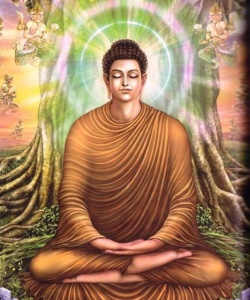Kriki
Kriki
訖哩枳王 (Skt; Jpn Kiriki-o)
A king who was a devout follower of Kashyapa Buddha. Kashyapa Buddha is the sixth of the seven Buddhas of the past, the last being Shakyamuni, according to the Long Agama Sutra and other texts. The Protection of the Sovereign of the Nation Sutra describes King Kriki's dreams and their interpretation by Kashyapa Buddha. According to the sutra, on one night the king had two dreams, one about ten monkeys and the other about a white elephant. The ten monkeys lived as a group. Nine of them harassed people in the city by stealing their food and drink. The tenth refused to join them and contented himself with what little he had. For this, the other nine monkeys ostracized him. In the other dream, there was a white elephant with an extra mouth at his tail that continuously devoured food yet the elephant always remained thin.
King Kriki asks Kashyapa Buddha about the meaning of the two dreams.The Buddha explains that the dreams represent the conditions of the Buddhist world following the death of Shakyamuni Buddha, who will appear in an age defiled by the five impurities. The ten monkeys represent ten kinds of monk-followers of Shakyamuni; the ostracized one who has little desire and knows satisfaction represents the true shramana, or seeker of the way. The other nine kinds of monks, represented by the nine greedy monkeys, will slander the true monk to the ruler and ministers, accusing him of performing evil acts and violating the precepts. As a result, the ruler will banish that monk, and Shakyamuni's teaching will be lost. These monks have nine different ulterior motives, such as the desire for fame and profit. The white elephant with two mouths represents those government officials in an age after Shakyamuni Buddha's death who always seek recognition and material reward from their ruler while harassing the common people. Ultimately, when they bring ruin upon themselves and their homes, they will renounce secular life and become evil monks, embrace erroneous ideas, and fall into hell. In this sutra, Shakyamuni Buddha relates the story of King Kriki's dreams to King Ajatashatru.
